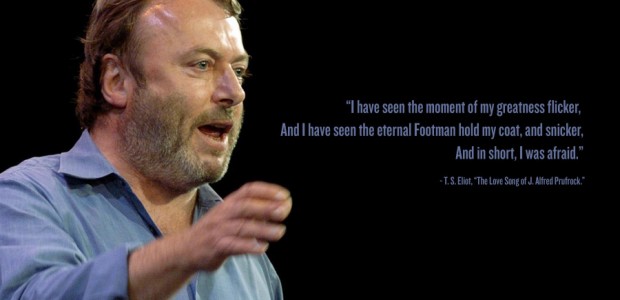After a long battle with cancer of the esophagus, Washington, D.C.-based writer, author and journalist Christopher Hitchens has died at the age of 62. Hitchins passed away at the MD Anderson Cancer Center in Houston, Texas from pneumonia, which was brought on as a complication of his cancer, and leaves behind his wife, 3 kids, and many fans and friends.
Most people know Christopher Hitchens from his work with Vanity Fair, who broke the news about his passing yesterday. He was quite open about his battle with cancer (making the announcement that he had cancer last year), and thus his death was not unexpected. While his death was sad to most who knew him, Hitchins had his fair share of detractors, including world leaders and even Mother Theresa!
Says Vanity Fair editor Graydon Carter, “There will never be another like Christopher. A man of ferocious intellect, who was as vibrant on the page as he was at the bar. Those who read him felt they knew him, and those who knew him were profoundly fortunate souls.”
Not without controversy, Hitchins had had some very memorable quotes worth noting:
“[Mother Teresa] was not a friend of the poor. She was a friend of poverty. She said that suffering was a gift from God. She spent her life opposing the only known cure for poverty, which is the empowerment of women and the emancipation of them from a livestock version of compulsory reproduction.”
–“Mommie Dearest”, 2003
“Judaism has some advantages over Christianity in that, for example, it does not proselytise — except among Jews — and it does not make the cretinous mistake of saying that the Messiah has already made his appearance. However, along with Islam and Christianity, it does insist that some turgid and contradictory and sometimes evil and mad texts, obviously written by fairly unexceptional humans, are in fact the word of god. I think that the indispensable condition of any intellectual liberty is the realisation that there is no such thing.”
– From Letter to a Young Contrarian, 2001
“Religion is man-made. Even the men who made it cannot agree on what their prophets or redeemers or gurus actually said or did.”
–From God Is Not Great: How Religion Poisons Everything, 2007
“Judaism has some advantages over Christianity in that, for example, it does not proselytise — except among Jews — and it does not make the cretinous mistake of saying that the Messiah has already made his appearance. However, along with Islam and Christianity, it does insist that some turgid and contradictory and sometimes evil and mad texts, obviously written by fairly unexceptional humans, are in fact the word of god. I think that the indispensable condition of any intellectual liberty is the realisation that there is no such thing.”
– From Letter to a Young Contrarian, 2001
“The only position that leaves me with no cognitive dissonance is atheism. It is not a creed. Death is certain, replacing both the siren-song of Paradise and the dread of Hell. Life on this earth, with all its mystery and beauty and pain, is then to be lived far more intensely: we stumble and get up, we are sad, confident, insecure, feel loneliness and joy and love. There is nothing more; but I want nothing more.”
–From The Portable Atheist: Essential Readings for the Non-believer, 2007
“Every day, the New York Times carries a motto in a box on its front page. ‘All the News That’s Fit to Print,’ it says. It’s been saying it for decades, day in and day out. I imagine most readers of the canonical sheet have long ceased to notice this bannered and flaunted symbol of its mental furniture. I myself check every day to make sure that the bright, smug, pompous, idiotic claim is still there. Then I check to make sure that it still irritates me. If I can still exclaim, under my breath, why do they insult me and what do they take me for and what the hell is it supposed to mean unless it’s as obviously complacent and conceited and censorious as it seems to be, then at least I know I still have a pulse. You may wish to choose a more rigorous mental workout but I credit this daily infusion of annoyance with extending my lifespan.”
– From Letter to a Young Contrarian, 2001
Regarding his cancer diagnosis, Hutchins wrote an essay for the August 2010 edition of vanity Fair stating, “I sometimes wish I were suffering in a good cause, or risking my life for the good of others, instead of just being a gravely endangered patient.” A few years earlier, he gained much popularity due to his manifesto for atheists titled “God is Not Great”.
Longtime colleague Salman Rushdie summed it up best with a tweet this morning stating, “Goodbye, my beloved friend. A great voice falls silent. A great heart stops.”

